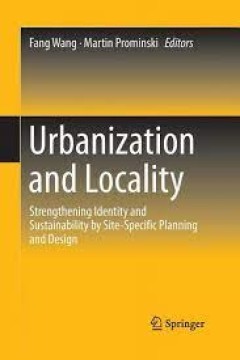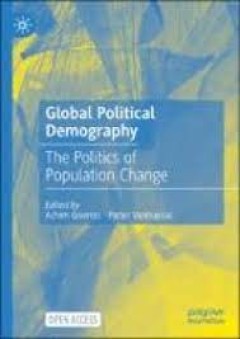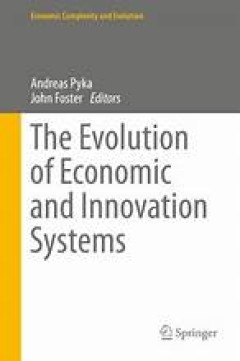Filter by
Exchange Rate Volatility and Macroeconomic Performance in Nigeria
- Edition
- -
- ISBN/ISSN
- 978-1-83969-881-1
- Collation
- -
- Series Title
- -
- Call Number
- -
Foreign Direct Divestment Phenomenon in Selected Sub-Saharan African Countries
- Edition
- -
- ISBN/ISSN
- 978-1-83969-881-1
- Collation
- -
- Series Title
- -
- Call Number
- -

Urbanization and Locality Strengthening Identity and Sustainability by Site-…
Based on a discussion of conflicts in the urbanization process, this book provides theoretical and practical solutions for the preservation and development of urban localities. On the basis of informative case studies, it reveals the similarities and unique aspects of urbanization in Germany and China. The process of urban growth and the future trend of locality and urbanization are also examin…
- Edition
- -
- ISBN/ISSN
- 978-3-662-48494-4
- Collation
- -
- Series Title
- -
- Call Number
- -

Engaging urban research in policy making: Towards equitable economic growth. …
Cities are considered “engines of economic growth,” yet many cities in the global South struggle to increase productivity and provide significant economic opportunities for their growing populations. There is a need to deepen the knowledge on the links between public goods and services and equitable economic growth and how to support such processes, in policy and strategic terms, locally an…
- Edition
- Ed. 1
- ISBN/ISSN
- 9783798332270, 9783798332270
- Collation
- 130
- Series Title
- -
- Call Number
- 338.9 ENG e

Industry-Led Growth Issues and Facts
The book explores, for India and other developing countries, the potential role the organized manufacturing sector could play as an engine of growth. Alongside growth, can this sector generate adequate employment opportunities to facilitate the transfer of labour from the agriculture sector? The book identifies the major constraints that result in limited demand for labour in the organised manu…
- Edition
- -
- ISBN/ISSN
- 978-981-10-0007-2
- Collation
- XIV, 88
- Series Title
- -
- Call Number
- 330 MIT i

Rethinking Economic Growth Theory From a Biophysical Perspective
Neoclassical growth theory is the dominant perspective for explaining economic growth. At its core are four implicit assumptions: 1) economic output can become decoupled from energy consumption; 2) economic distribution is unrelated to growth; 3) large institutions are not important for growth; and 4) labor force structure is not important for growth. Drawing on a wide range of data from the ec…
- Edition
- Ed. 1
- ISBN/ISSN
- 978-3-319-12826-9
- Collation
- -
- Series Title
- -
- Call Number
- -

Global Political Demography The Politics of Population Change
This open access book draws the big picture of how population change interplays with politics across the world from 1990 to 2040. Leading social scientists from a wide range of disciplines discuss, for the first time, all major political and policy aspects of population change as they play out differently in each major world region: North and South America; Sub-Saharan Africa and the MENA regio…
- Edition
- -
- ISBN/ISSN
- 9783030730659
- Collation
- -
- Series Title
- -
- Call Number
- -

Development Discourse and Global History From colonialism to the sustainable…
The manner in which people have been talking and writing about ‘development’ and the rules according to which they have done so have evolved over time. Development Discourse and Global History uses the archaeological and genealogical methods of Michel Foucault to trace the origins of development discourse back to late colonialism and notes the significant discontinuities that led to the est…
- Edition
- -
- ISBN/ISSN
- -
- Collation
- -
- Series Title
- -
- Call Number
- -

Trends in Mathematical Economics Dialogues Between Southern Europe and Latin…
This book gathers carefully selected works in Mathematical Economics, on myriad topics including General Equilibrium, Game Theory, Economic Growth, Welfare, Social Choice Theory, Finance. It sheds light on the ongoing discussions that have brought together leading researchers from Latin America and Southern Europe at recent conferences in venues like Porto, Portugal; Athens, Greece; and Guanaju…
- Edition
- -
- ISBN/ISSN
- 978-3-319-32543-9
- Collation
- -
- Series Title
- -
- Call Number
- -

The Evolution of Economic and Innovation Systems
This book is at the cutting edge of the ongoing ‘neo-Schumpeterian’ research program that investigates how economic growth and its fluctuation can be understood as the outcome of a historical process of economic evolution. Much of modern evolutionary economics has relied upon biological analogy, especially about natural selection. Although this is valid and useful, evolutionary economists h…
- Edition
- 1
- ISBN/ISSN
- 978-3-319-13299-0
- Collation
- VII, 641, 39 b/w illustrations, 63 illustrations in colour
- Series Title
- Economic Complexity and Evolution
- Call Number
- -
 Computer Science, Information & General Works
Computer Science, Information & General Works  Philosophy & Psychology
Philosophy & Psychology  Religion
Religion  Social Sciences
Social Sciences  Language
Language  Pure Science
Pure Science  Applied Sciences
Applied Sciences  Art & Recreation
Art & Recreation  Literature
Literature  History & Geography
History & Geography